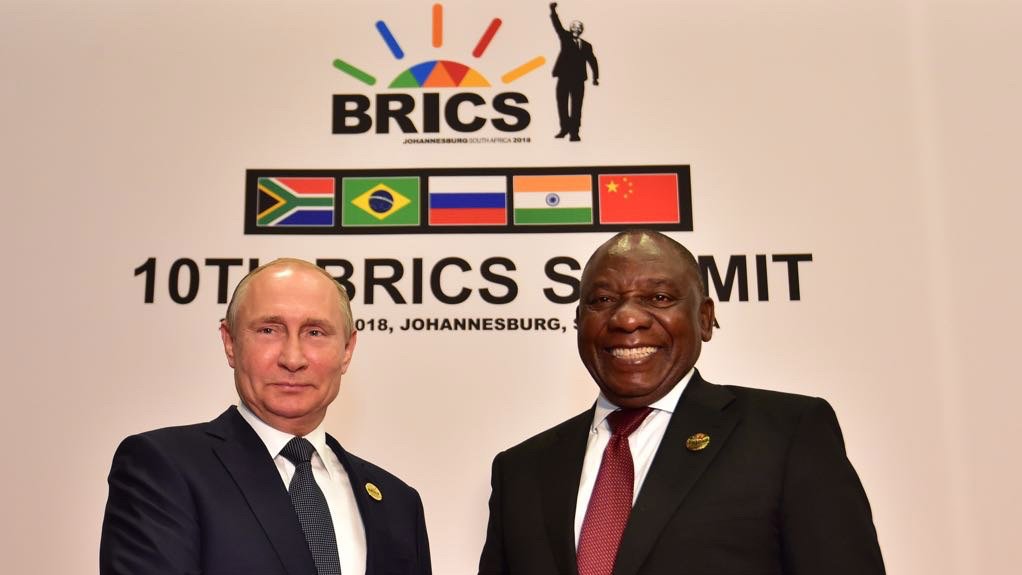President Cyril Ramaphosa asked Russian President Vladimir Putin not to attend the Brics summit but could not announce Putin's non-attendance before receiving support from the Chinese and Indian heads of state.
Ramaphosa, in a supplementary affidavit filed in the Gauteng High Court in Pretoria, said it was "moot" for the Democratic Alliance (DA) to continue its application to compel the government to state whether it would have executed the International Criminal Court's (ICC) arrest warrant on Putin.
This followed the Russian president saying he would not attend the Johannesburg summit next month.
Ramaphosa's supplementary statement was filed on Tuesday before Wednesday's announcement Putin would not attend by "mutual agreement".
The ICC issued an arrest warrant for Putin in March for alleged war crimes in Russia's war with Ukraine that began in February last year.
In his affidavit, Ramaphosa said he first asked Putin not to attend Africa's Ukraine-Russia peace summit on 19 June, and the Russian leader said he would "apply his mind" to the request.
Three days later, Ramaphosa added he met with Brazil President Lula da Silva at the Global Financing Pact summit in Paris, France, and lobbied South Africa's position that Putin does not attend the Brics summit, expected to run from 22 to 24 August.
"At this meeting [with Da Silva], the president of Brazil agreed that the preferred option, being that President Putin would not attend the [Brics] summit in person, had his support," he said.
Ramaphosa said the Brics formation worked on "a consensus" and buy-in had to be sought and received from all five member countries before a decision was taken.
"I believe that in these circumstances the DA's application is moot and must be withdrawn," he added.
On Thursday, News24 reported the DA was forging ahead with its application, despite Putin saying he would not attend.
The party's leader, John Steenhuisen, said it sought a declaratory order for this saga not to repeat itself.
"[We] believe that we will continue to court because we believe that the obligation of [the] government needs to be confirmed and because we would like the precedent to be set for any future situations such as this that may [arise]," he said.
On Thursday, Department of International Relations and Cooperation spokesperson Clayson Monyela said the government knew for a month Putin would not physically attend the summit.
Monyela added the delay was due to the ironing out of diplomatic issues.
Ramaphosa had consulted Brics member state leaders of China, Russia, and India.
The president told the court by Tuesday, the department had not managed to arrange a meeting with China President Xi Jinping and Indian Prime Minister Narendra Modi.
Ramaphosa asked the court to keep his supplementary affidavit confidential so as not to jeopardise the negotiations and consensus-seeking efforts.
The department's director-general, Zane Dangor, in his confirmatory affidavit, told the court contacting Brics heads of state was "time consuming and difficult to arrange" owing to the leaders' schedules.
"Such consultations are always complex, and there is nothing unique about the amount of work needed to arrange them, or the time it takes to finalise such discussions with five heads of state," Dangor said, adding the consultations were finalised on Tuesday.
Putin would attend the summit virtually and be physically represented by his foreign minister, Sergey Lavrov.
The Russian leader's decision had been labelled as reasonable by the Presidency and Russia's most significant political party, United Russia.
The South African Sherpa to Brics, speaking at the media engagement, Professor Anil Sooklal, said Ramaphosa had engaged with Brics leaders regarding Putin's visit.
The Brics ambassador labelled the Russian president's decision not to come as a substantial move which allowed the summit not to face threats of withdrawal like the G20 summit in Indonesia in 2022.
Other world leaders had protested the participation of Putin attending the summit, which prompted him to participate virtually.
Sooklal said the Russian leader's decision not to attend showed "maturity" among leaders to ensure the summit went ahead without threats of a walkout as a mutual agreement by participating leaders.
"The agreement, the president has done exceptionally well. This decision was not taken between President Ramaphosa and President Putin.
"Over the past several months, our president has engaged with all Brics leaders several times. Brics is a consensus basis; President Putin's absence at the summit impacts all the other leaders.
"This shows maturity and the strength of the alliance that we could come to a decision that, yes, President Putin understands the dilemma that South Africa faces, and he did not want to jeopardise the summit and create problems for South Africa," Sooklal said.
EMAIL THIS ARTICLE SAVE THIS ARTICLE
To subscribe email subscriptions@creamermedia.co.za or click here
To advertise email advertising@creamermedia.co.za or click here











